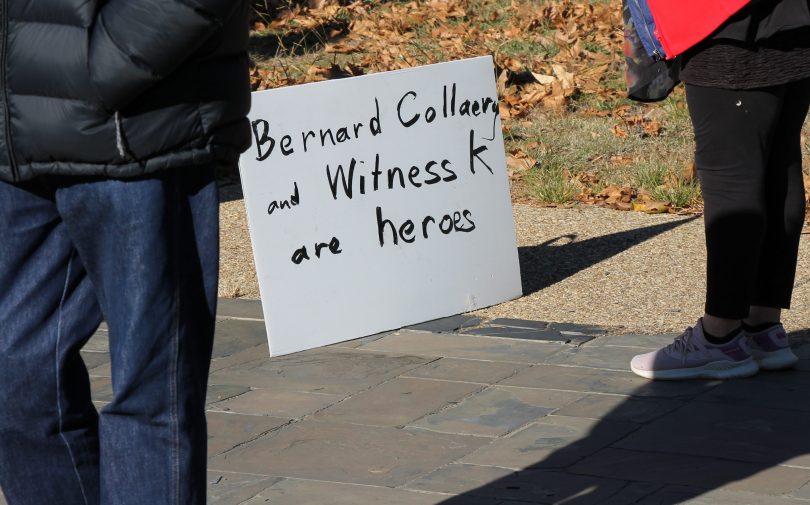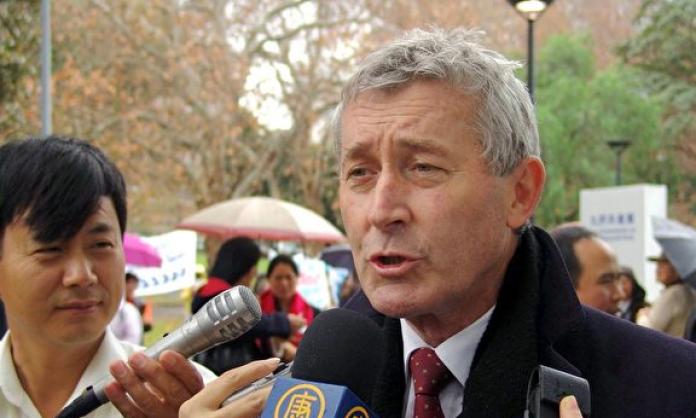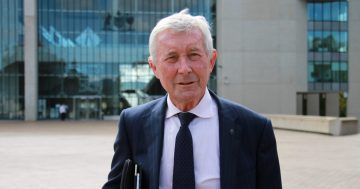
Protesters supporting Witness K and Bernard Collaery outside the ACT Courts in May. Photo: Albert McKnight.
Witness K has avoided spending time in jail after he was sentenced in a case that lasted eight years and drove a national discussion around government secrecy.
As has previously been published, the now elderly man blew the whistle in 2012 about Australian intelligence services bugging the Timor-Leste cabinet room during 2004 discussions over the Timor gas treaty.
When Magistrate Glenn Theakston handed down his sentence, he said Witness K’s involvement may have been based on a need to provide justice, but breaches of this type involving secret organisations “should not be tolerated”.
The small room in the ACT Magistrates Court was crammed with people on Thursday and Friday (17 and 18 June) as Witness K sat behind large black boards, hidden from view.
Great lengths had been taken to conceal the identity of the former spy and hero to the Timorese who has received various honours and awards over his career.
Windows in the courtroom had been covered, those entering had to surrender their phones at the door, and even black tape had been used to block the gaps between the large boards he sat behind.
The court was also closed at times to hear information kept secret from the public.
Magistrate Theakston told the court Witness K was accused of conspiring with his lawyer Bernard Collaery between 21 February and 2 November 2013 to illegally communicate information relating to the government of Timor Leste that he had acquired while working for the Australian Secret Intelligence Service (ASIS).
He asked him how he would plead to a single charge of conspiracy.
“Guilty, your honour,” Witness K softly said behind the boards.

Former ACT Attorney-General Bernard Collaery is fighting the charges against him over his alleged involvement with the Witness K case. Photo: File.
In April 2013, Timor Leste began proceedings against Australia in the Permanent Court of Arbitration, claiming Australia had acted in bad faith during treaty negotiations.
Prosecutor Richard Maidment QC alleged a “consummated conspiracy” between Witness K and Mr Collaery by 7 May 2013, shown by a signed affidavit that was intended to be given to the Timor Leste Government.
This affidavit, containing information about ASIS’s functions and identifying Witness K as a member of the organisation, was never filed.
“The intention was clearly to disclose it to them [the Timor Leste Government] eventually in support of the proceedings,” he said.
Witness K also made another affidavit in November 2013, a version of his earlier one, which was filed. But the prosecution was not aware of this affidavit until late in the court proceedings.
Magistrate Theakston said the information had not been released for financial gain or to compromise Australia’s national security interests, but to participate in the international court to decide the dispute between the two countries.
Witness K’s barrister, Robert Ritcher QC, had argued his elderly client should be sentenced to a good behaviour order without a conviction, noting the “extraordinary circumstances of this case”.
“There is no utility at this stage in convicting Mr K,” he said.
“Mr K is a much-decorated officer… [with a] blameless and spotless reputation that has earned commendations in a very lengthy career.”
Mr Ritcher said for the last eight years “he’s essentially been imprisoned in his own home” after his house was raided in 2013, had his passport confiscated and knew he could be prosecuted from that day onwards.
Mr Ritcher said it took two years, to 2015, before the Commonwealth Director of Public Prosecutions made an application to the Attorney-General at the time, George Brandis, to prosecute Witness K.
But Mr Brandis did not make a decision on the case and it was not until March 2018 when the next Attorney-General, Christian Porter, approved the prosecution.
It was a decision that, along with the prosecution of Mr Collaery, has cost taxpayers about $4 million.
Mr Ritcher said the three-year delay had brought “additional torment” to his client, and for the last eight years, while effectively imprisoned at home, he had been unable to do the activities that would reduce his anxiety and depression.
Magistrate Theakston said a traumatic and large-scale event had impacted Witness K’s mental health and he had post-traumatic stress disorder.
He found a nexus between the offending of Witness K, who retired in 2005 and is now over 70, and his mental health issues.
However, he also said Witness K had made “an express, deliberate breach” when disclosing sensitive information and his punishment needed to remind others that even when they finished work with an organisation, they still had obligations to protect secrets.
Witness K was sentenced to three months’ jail, fully suspended for a 12-month recognisance release order for which he had to forfeit $1000.
Mr Collaery, who is fighting his charges, will return to court at a later date.













